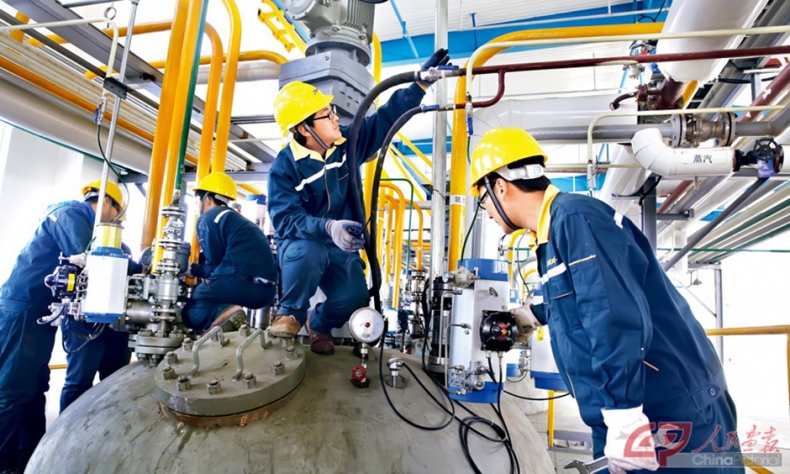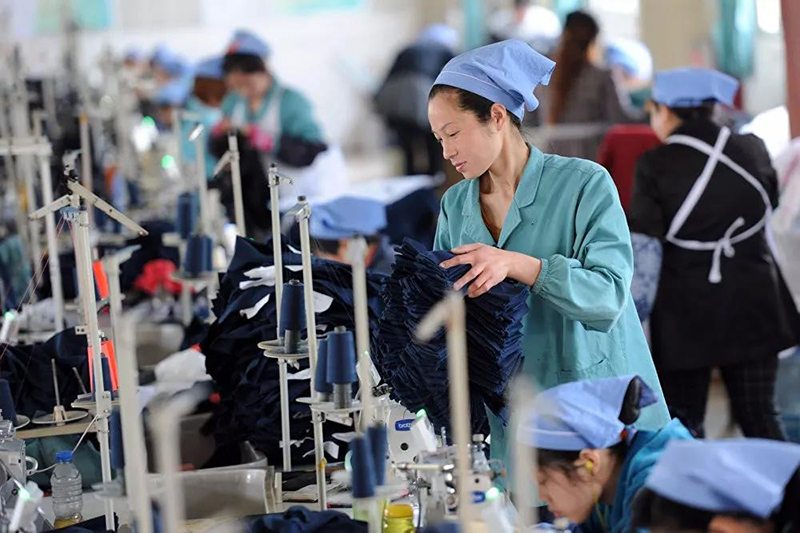Private Sector will Continue to Play a Vital Role

The private economy is the most energetic, promising and creative force in the socialist market economy with Chinese characteristics.
Recently, the development of private enterprises has attracted a lot of social attention. At the end of September, Chinese government leaders reaffirmed the policy of steadily developing the non-public sector of the economy, providing reassurance to private economy in China. In fact, the public and non-public sectors of the economy are like the two wings of a bird, neither of them can be overlooked. In the past 40 years of reform and opening up, Chinese private enterprises have grown from scratch and developed rapidly with strong competitiveness, playing an increasingly important role in the Chinese economy and becoming a supporting force for China’s social and economic development. It will continue to be an essential player in China’s high-quality development in the future.
Δ China unveiled its latest ranking for 500 largest private enterprises on Aug. 29, 2018, with telecom equipment giant Huawei and e-commerce firm Suning atop the list amid sound development of the country’s private business.
The Private Economy Supports Half of the Chinese Economy
The private economy is the most energetic, promising and creative force in the socialist market economy with Chinese characteristics. It is a strong support for the prosperity of the urban and rural economy and an important force for promoting China’s economic development.
Since the start of reform and opening up, private sector enterprises have played an important role in creating employment, tax revenue and promoting economic development. In recent years, private-sector enterprises have become the economic bright spots. Among the newly released top 500 Chinese enterprises in 2018, private-sector enterprises comprise 237, an increase of 11 over last year. At present, the total assets of the top 500 private-sector enterprises have exceeded 28 trillion yuan ($4 trillion), and the total net profit after taxes has exceeded 1 trillion yuan ($144.5 billion) for the first time.
A private-sector enterprise’s flexible mechanism makes it easier for it to fit into the market and more effective in optimizing the industrial structure and promoting technological innovation, transformation and upgrading. It is calculated that 65 percent of China’s patents, over 75 percent of technological innovations and more than 80 percent of new product development are done by private-sector.
Δ At the end of 2017, private businesses provided more than 80 percent of urban jobs.
As a new force in the national economy, the private sector is the main source of jobs. According to National Federation of Industry and Commerce statistics, the private economy provides more than 80 percent of jobs in urban employment and contributes more than 90 percent to new employment, and has absorbed more than 70 percent of labor transferred from rural areas.
Private enterprises have contributed half of the Chinese economy. By the end of 2017, there are more than 27 million private-sector enterprises in China and more than 65 million individual industrial and commercial households, with registered capital exceeding 165 trillion yuan ($23.8 trillion); the private economy accounted for more than 60 percent of the GDP and more than 50 percent of total tax revenue.
At present, China’s economy has entered a new normal. Confronted with the increasing pressure of economic downturn, the accelerating economic restructuring and upgrading process and the complicated international situation, private-sector enterprises are faced with unprecedented opportunities brought about by major national strategies and reforms, as well as national domestic problems including an imperfect governance structure, weak competitiveness, poor sustainable development and external difficulties and challenges such as domestic and international environmental constraints, heavy tax burdens and financing difficulties.
Healthy, Sustainable Development for the Private Enterprises
Amid this situation, the growth rate of private investment has fallen sharply in recent years. According to statistics, the growth rate of China’s private investment has fallen off since 2012. By 2016, the growth rate of private investment fell to 3.2 percent. Although it rebounded to 6 percent in 2017 and to 8.7 percent in the January-August 2018 period, it is a dramatic drop compared with the high growth of more than 30 percent before 2012. In the future, the healthy and sustainable development of private-sector enterprises must be highly valued because it directly relates to China’s economic prospects and the success of China’s comprehensive reform and opening up.
In view of this, the Chinese government has attached more importance to the private sector. The report of the 19th National Congress of the Communist Party of China emphasized that it shall be firm in consolidating and developing the public sector of the economy and shall remain steadfast in encouraging, supporting, and guiding the development of the non-public sector.
Δ Chinese President Xi Jinping visits a workshop of China Zhongwang Holdings Ltd on September 27, and inspects the enterprise’s development of transformation and upgrading.
At the end of September, during an inspection tour in Liaoning Province, President Xi Jinping went to a state-owned enterprise and a private enterprise, and stressed that China adopts a basic economic system in which public ownership is the mainstay of the economy and economic entities of diverse ownership develop together.
“Private enterprises should strengthen their confidence,” he said, noting that the CPC Central Committee has always supported and encouraged the development of the private economy and has rolled out a slew of reforms to help the sector develop since the 18th CPC National Congress.
Xi urged efforts to create a sound legal and business environment for private enterprises, protect their rights and interests in accordance with the law and work to encourage, support, and guide the development of the non-public sector.
The Further Optimizing of the Business Environment for Private Enterprises
The key to stimulate the vitality of the private sector lies in the development of a comprehensive good business environment.
When Xi was in Liaoning, he proposed the creation of a high degree legal environment for private enterprises and the further optimizing of the business environment.
Δ Chinese Premier Li Keqiang addresses the opening plenary of the Annual Meeting of the New Champions 2018, also known as Summer Davos, in Tianjin, north China, Sept. 19, 2018. (Photo/Xinhua)
In his opening speech at the 2018 Tianjin Summer Davos Forum, Chinese Premier Li Keqiang reiterated that China will further implement and improve policies and measures to support the development of the private economy and eliminate obstacles that hinder that development. He added that the Chinese government will make more efforts to ease market access for private enterprises.
The 2018 Government Work Report pointed out that we will uphold the principle of equal rights, equal opportunities and fair rules. We will implement fully all policies and measures in support of non-public sector development, earnestly address salient problems that concern private companies and take firm action to remove hidden barriers.
China is on its way to deepening reform and opening up. With the steady advancement of reforms and the continuous implementation of various measures to support the private economy, the “glass door”, “spring door” and “revolving door” faced by private enterprises in the industry access will gradually disappear. Issues faced by private enterprises such as financing difficulties and tax burdens will be gradually resolved.
The private economy will usher in a new round of development and prosperity, making new contributions to the high-quality development of China’s economy to achieve the two centenary goals.
Researcher Zhang Maorong, Institute of World Economics, China Institute of Contemporary International Relations
Edited by Li Gang
 Facebook
Facebook
 Twitter
Twitter
 Linkedin
Linkedin
 Google +
Google +














